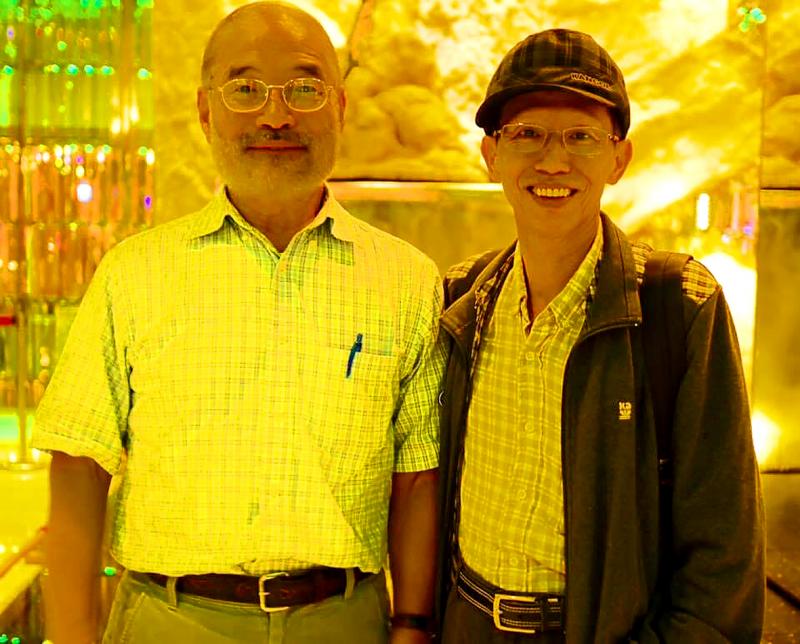Peter Tsai (蔡秉燚), the Taiwan-born inventor of the key technology used in N95 respirators and masks, is studying ways to sterilize masks for reuse amid a global shortage due to the COVID-19 pandemic.
Tsai, 68, said that he was motivated not by money, but by a desire to help others.
“Given the choice, I would prefer to help 100 million people rather than earn US$100 million,” Tsai said on Wednesday.

Photo courtesy of National Taipei University of Technology alumni Huang Chun-chung
Tsai, who has retired from his work as a researcher at the University of Tennessee, wrote an article for the University of Tennessee Research Foundation in which he explored ways to sterilize and reuse masks.
After graduating from the Provincial Taipei Institute of Technology, now known as National Taipei University of Technology, Tsai worked at the Taiwan Textile Research Institute in then-Taipei County, before transferring to a dyeing and finishing plant.
At the time, textile equipment and technology were imported from the US, Europe and Japan, Tsai said.
Spurred by his interest in the industry, he moved to the US to attend graduate school.
At Kansas State University he threw himself wholeheartedly into his studies, completing more than 500 credits — the equivalent of six doctoral degrees of course material, he said.
Tsai’s coursework and research touched upon a variety of disciplines, including hydrodynamics, electrical engineering and material science, and in his experiments he used computers to rapidly model theoretical results.
After graduation, he became a research fellow at the University of Tennessee and in 1992 led a research team that developed two key technologies that would be used in respirators.
Tsai’s research in melt blowing and electrostatic charging technologies greatly improved the filtration efficiency of nonwoven fabrics used in masks, allowing submicron particles to be captured and stopped from traveling through the masks, the Nonwoven Fabrics Industry Association said on Facebook on April 6.
After seeing the pandemic worsen and the global mask shortage, Tsai wrote a research paper on ways to extend the life of disposable masks.
The paper has garnered the attention of researchers at several US schools, including the Massachusetts Institute of Technology, Harvard University, Yale University and Stanford University.
“They told me I could earn a lot from these findings, but I would rather help people than make money,” Tsai said.

Chinese Nationalist Party (KMT) Chairman Eric Chu (朱立倫), spokeswoman Yang Chih-yu (楊智伃) and Legislator Hsieh Lung-chieh (謝龍介) would be summoned by police for questioning for leading an illegal assembly on Thursday evening last week, Minister of the Interior Liu Shyh-fang (劉世芳) said today. The three KMT officials led an assembly outside the Taipei City Prosecutors’ Office, a restricted area where public assembly is not allowed, protesting the questioning of several KMT staff and searches of KMT headquarters and offices in a recall petition forgery case. Chu, Yang and Hsieh are all suspected of contravening the Assembly and Parade Act (集會遊行法) by holding

PRAISE: Japanese visitor Takashi Kubota said the Taiwanese temple architecture images showcased in the AI Art Gallery were the most impressive displays he saw Taiwan does not have an official pavilion at the World Expo in Osaka, Japan, because of its diplomatic predicament, but the government-backed Tech World pavilion is drawing interest with its unique recreations of works by Taiwanese artists. The pavilion features an artificial intelligence (AI)-based art gallery showcasing works of famous Taiwanese artists from the Japanese colonial period using innovative technologies. Among its main simulated displays are Eastern gouache paintings by Chen Chin (陳進), Lin Yu-shan (林玉山) and Kuo Hsueh-hu (郭雪湖), who were the three young Taiwanese painters selected for the East Asian Painting exhibition in 1927. Gouache is a water-based

Taiwan would welcome the return of Honduras as a diplomatic ally if its next president decides to make such a move, Minister of Foreign Affairs Lin Chia-lung (林佳龍) said yesterday. “Of course, we would welcome Honduras if they want to restore diplomatic ties with Taiwan after their elections,” Lin said at a meeting of the legislature’s Foreign Affairs and National Defense Committee, when asked to comment on statements made by two of the three Honduran presidential candidates during the presidential campaign in the Central American country. Taiwan is paying close attention to the region as a whole in the wake of a

OFF-TARGET: More than 30,000 participants were expected to take part in the Games next month, but only 6,550 foreign and 19,400 Taiwanese athletes have registered Taipei city councilors yesterday blasted the organizers of next month’s World Masters Games over sudden timetable and venue changes, which they said have caused thousands of participants to back out of the international sporting event, among other organizational issues. They also cited visa delays and political interference by China as reasons many foreign athletes are requesting refunds for the event, to be held from May 17 to 30. Jointly organized by the Taipei and New Taipei City governments, the games have been rocked by numerous controversies since preparations began in 2020. Taipei City Councilor Lin Yen-feng (林延鳳) said yesterday that new measures by